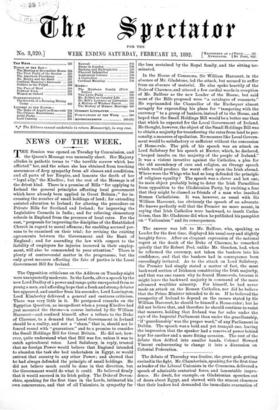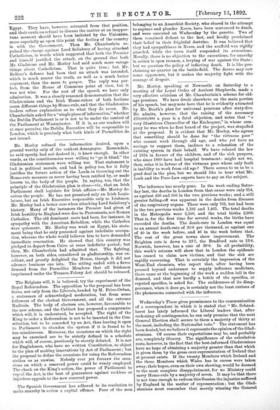The debate of Thursday was livelier, the great gods getting
excited in the fight. Mr. Chamberlain, speaking for the first time as leader of the Liberal Unionists in the Commons, delivered a speech of admirable oratorical force, and lamentable impru- dence. He dwelt, for example, on Gladstonian speeches out of doors about Egypt, and showed with the utmost clearness that their leaders had demanded the immediate evacuation of
Egypt. They have, however, retreated from that position, and their cautious refusal to discuss the matter at an inoppor- tune moment should have been imitated by the Unionists, more especially as upon this point the feeling of the country is with the Government. Then Mr. Chamberlain re- pulsed the charge against Lord Salisbury of having attacked Catholicism, in words which suggested that both the Premier and himself justified the attack, on the ground that both Mr. Gladstone and Mr. Morley had said much more savage things about Catholicism. That is quite true ; but Mr. Balfour's defence had been that no attack was intended, which is much nearer the truth, as well as a much better argument, than the mere fu quoque. The reply was per- fect, from the House of Commons point of view, but it was not wise. For the rest of the speech we have only admiration. It was a closely reasoned demonstration that the Gladstonians and the Irish Home-rulers of both factions mean different things by Home-rule, and that the Gladstonian leaders refuse explanation as to what they do mean. Mr. Chamberlain asked for a " single piece of information," whether the Dublin Parliament is or is not to be under the control of the Parliament at Westminster. If it is, as our readers will at once perceive, the Dublin Executive will be responsible to London, which is precisely what both kinds of Parnellites do not intend.



































